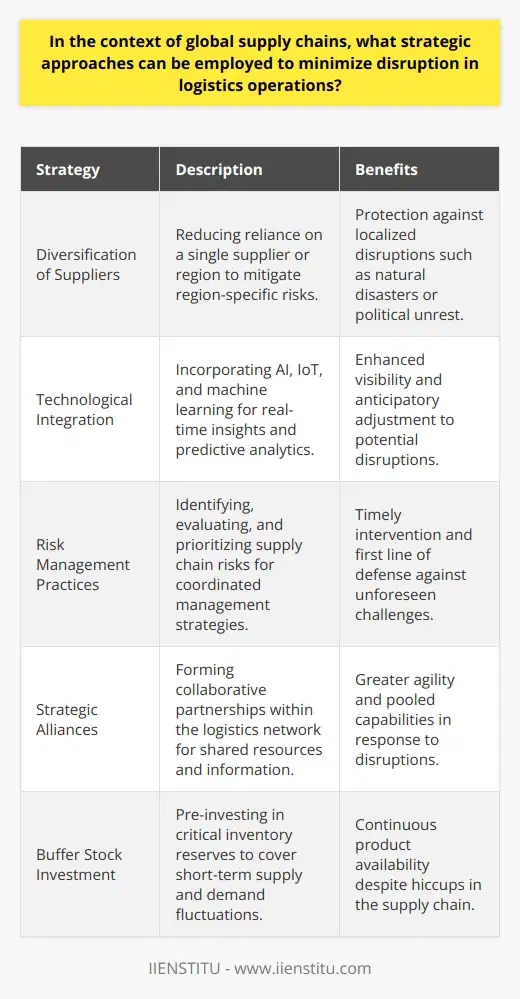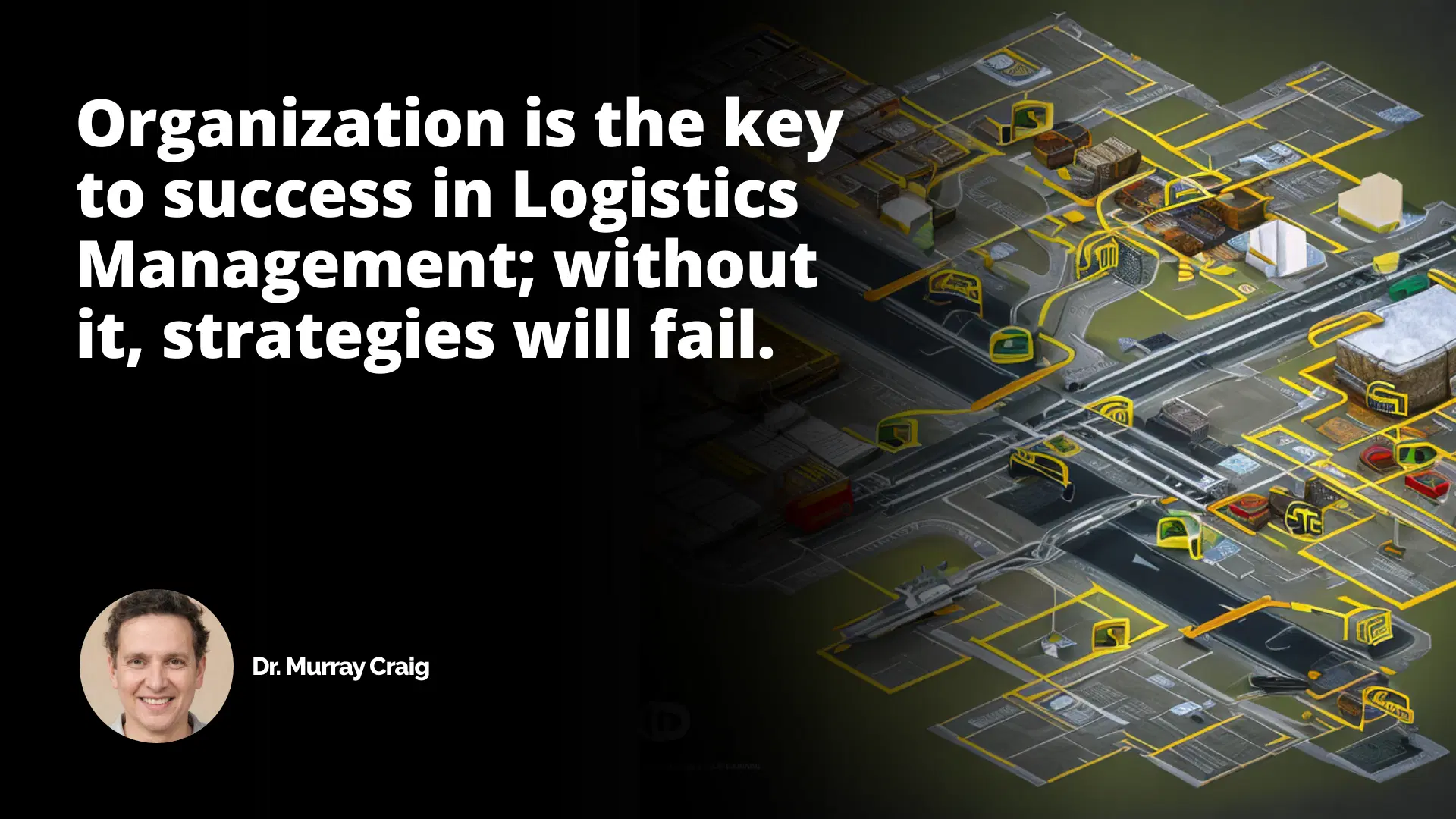
Introduction
As a seasoned professional in the field of logistics, I've witnessed firsthand the profound impact that effective logistics management strategies can have on a company's success. From optimizing inventory levels to streamlining transportation processes, the intricacies of the supply chain are vast and ever-evolving. In this comprehensive guide, we'll delve into the world of logistics management, exploring its essential components, best practices, and the transformative role of technology in shaping the future of the industry.
The Fundamentals of Logistics Management
At its core, logistics management is the process of planning, implementing, and controlling the efficient flow of goods, services, and information from the point of origin to the point of consumption. As Christopher (2011) defines it in his seminal work "Logistics & Supply Chain Management," it encompasses all activities involved in moving products from suppliers to customers, including sourcing raw materials, manufacturing, warehousing, transportation, and distribution.
Introduction to Logistics Management
Increasing Efficiency and Reducing Costs
Improving Customer Service
Utilizing Data and Technology for Logistics Management
Effective inventory management techniques are a crucial aspect of logistics management. By maintaining optimal stock levels, companies can minimize holding costs while ensuring product availability. Chopra and Meindl (2016) discuss various inventory management strategies in their book "Supply Chain Management: Strategy, Planning, and Operation," such as:
1- ABC Analysis: Categorizing inventory based on value and importance.
2- Economic Order Quantity (EOQ): Determining the optimal order quantity to minimize costs.
3- Just-in-Time (JIT) Inventory: Synchronizing inventory levels with production schedules.
4- Safety Stock: Maintaining a buffer to mitigate the risk of stockouts.
Implementing these techniques requires a deep understanding of demand patterns, lead times, and supplier relationships. Optimizing supply chain efficiency is an ongoing process that involves continuous monitoring, analysis, and improvement.
The Importance of Logistics in Business
In today's highly competitive business landscape, logistics management plays a pivotal role in determining a company's success. Efficient logistics operations can lead to reduced costs, improved customer satisfaction, and increased market share. As Simchi-Levi, Kaminsky, and Simchi-Levi (2008) emphasize in "Designing and Managing the Supply Chain," a well-designed logistics network can provide a significant competitive advantage.
Consider the case of Amazon, a company that has revolutionized the e-commerce industry through its innovative logistics strategies. By investing heavily in advanced warehousing and distribution systems, Amazon has been able to offer unparalleled delivery speeds and reliability, setting the standard for customer expectations.
The Importance of Customer Service in Logistics
In the realm of logistics, customer service goes beyond simply delivering products on time. It encompasses the entire customer experience, from order placement to after-sales support. As Murphy and Knemeyer (2018) highlight in "Contemporary Logistics," effective customer service in logistics involves:
Best Transportation Modes For Optimizing Logistics Management
Optimizing Logistics Management İn Manufacturing To Reduce Costs And İmprove Efficiency
Accurate order fulfillment: Ensuring that the right products are delivered to the right customers.
Timely delivery: Meeting promised delivery dates and minimizing transit times.
Transparent communication: Providing real-time tracking information and proactive updates.
Responsive support: Addressing customer inquiries and resolving issues promptly.
By prioritizing customer service, logistics providers can build strong relationships, foster loyalty, and differentiate themselves in a crowded market.
Technology in Logistics Management
The advent of advanced logistics technologies has revolutionized the way supply chains operate. From warehouse automation to real-time tracking systems, technology has enabled unprecedented levels of efficiency and visibility. Rushton, Croucher, and Baker (2014) explore the impact of technology on logistics in "The Handbook of Logistics and Distribution Management," highlighting key innovations such as:
1- Warehouse Management Systems (WMS): Software solutions that optimize inventory storage, picking, and packing processes.
2- Transportation Management Systems (TMS): Platforms that streamline transportation planning, execution, and tracking.
Organization is the key to success in Logistics Management; without it, strategies will fail.
3- Radio Frequency Identification (RFID): Tags that enable real-time tracking of inventory and assets.
4- Internet of Things (IoT): Connected devices that provide real-time data on supply chain performance.
By leveraging these technologies, logistics providers can achieve greater efficiency, responsiveness, and transparency. However, implementing these solutions requires significant investments in infrastructure, training, and change management.
Career Growth in Logistics Management
The field of logistics management offers diverse and rewarding career opportunities. As Ballou (2007) discusses in "Business Logistics/Supply Chain Management," the skills required for success in logistics include:
Analytical thinking: The ability to interpret data, identify trends, and make data-driven decisions.
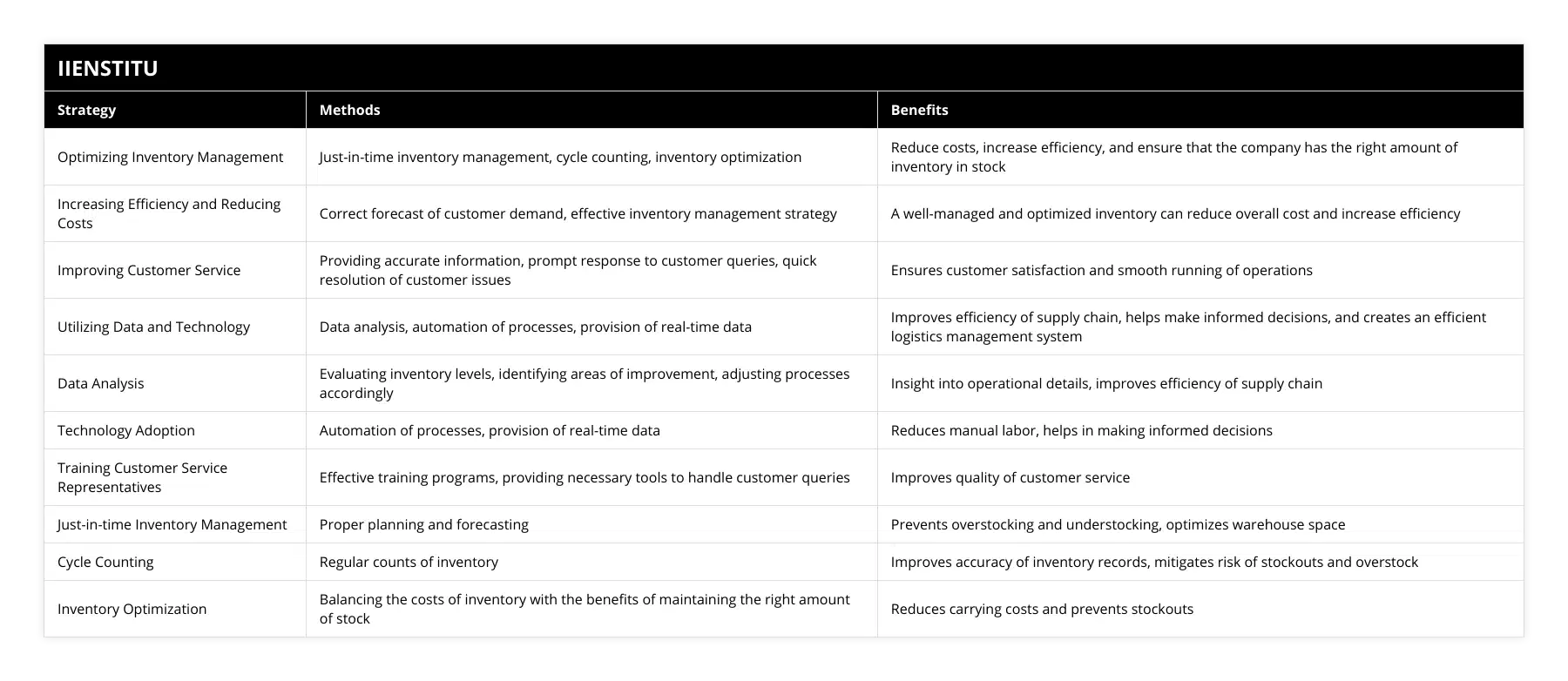
Problem-solving: The capacity to navigate complex challenges and develop innovative solutions.
Communication: The ability to collaborate with cross-functional teams and external partners.
Leadership: The skills to motivate and guide teams towards common goals.
Pursuing certifications, such as the Certified Supply Chain Professional (CSCP) or the Certified in Logistics, Transportation and Distribution (CLTD), can enhance one's credibility and career prospects. Additionally, staying abreast of industry trends and continually expanding one's knowledge base are essential for long-term success.
Sustainable Logistics Practices
In recent years, sustainability has become a critical consideration in logistics management. As environmental concerns continue to grow, companies are increasingly adopting sustainable practices to reduce their ecological footprint and meet the expectations of socially conscious consumers. Simchi-Levi, Kaminsky, and Simchi-Levi (2008) discuss various sustainable logistics strategies, such as:
1- Optimizing transportation routes: Minimizing fuel consumption and emissions through efficient routing and consolidation.
2- Reducing packaging waste: Using eco-friendly materials and minimizing excessive packaging.
3- Implementing reverse logistics: Establishing processes for the collection, reuse, and recycling of products and materials.
4- Collaborating with suppliers: Encouraging sustainable practices throughout the supply chain.
By embracing sustainability, logistics providers can not only contribute to environmental preservation but also enhance their brand reputation and attract environmentally conscious customers.
Challenges in Global Supply Chains
In an increasingly interconnected world, managing global supply chains presents unique challenges. From navigating complex regulations to mitigating the impact of geopolitical risks, logistics professionals must be adept at managing uncertainties. As Christopher (2011) emphasizes, the key challenges in global logistics include:
Cultural differences: Understanding and adapting to diverse business practices and communication styles.
Regulatory compliance: Ensuring adherence to varying legal and customs requirements across different countries.
Infrastructure limitations: Navigating inadequate transportation networks and logistics facilities in certain regions.
Currency fluctuations: Managing the financial risks associated with exchange rate volatility.
To overcome these challenges, logistics providers must develop robust risk management strategies, foster strong partnerships with local experts, and maintain a high degree of flexibility and adaptability.
Conclusion
In conclusion, effective logistics management is a critical driver of business success. By optimizing inventory levels, streamlining transportation processes, leveraging technology, and prioritizing customer service, companies can achieve significant competitive advantages. However, the path to excellence in logistics is not without its challenges. From navigating the complexities of global supply chains to embracing sustainable practices, logistics professionals must continuously adapt and innovate.
As the great management thinker Peter Drucker once said, "The best way to predict the future is to create it." In the ever-evolving world of logistics, this sentiment rings true. By staying at the forefront of industry trends, investing in talent development, and fostering a culture of continuous improvement, logistics providers can not only weather the storms of change but also shape the future of the industry.
So, whether you're a seasoned logistics professional or just starting your journey in this dynamic field, remember that the key to success lies in your ability to navigate complexity, embrace innovation, and always keep the customer at the heart of everything you do. With dedication, perseverance, and a commitment to excellence, the opportunities in logistics management are truly limitless.
References:
Ballou, R. H. (2007). Business Logistics/Supply Chain Management. Pearson Education.
Chopra, S., & Meindl, P. (2016). Supply Chain Management: Strategy, Planning, and Operation. Pearson.
Christopher, M. (2011). Logistics & Supply Chain Management. Pearson UK.
Murphy, P. R., & Knemeyer, A. M. (2018). Contemporary Logistics. Pearson.
Rushton, A., Croucher, P., & Baker, P. (2014). The Handbook of Logistics and Distribution Management. Kogan Page Publishers.
Simchi-Levi, D., Kaminsky, P., & Simchi-Levi, E. (2008). Designing and Managing the Supply Chain. McGraw-Hill.
Frequently Asked Questions
What strategies can be used to optimize inventory management in logistics management?
An effective inventory management strategy in logistics management requires careful planning and execution. Companies should begin by analyzing their current inventory levels and identifying areas for improvement. They should then develop strategies for optimizing their inventory, such as utilizing data analysis to make informed decisions, automating processes with technology, and reducing manual labor. Additionally, companies should focus on increasing efficiency, reducing costs, and improving customer service. By utilizing data and technology, companies can create a cost-effective and efficient logistics management system that will help them achieve success.
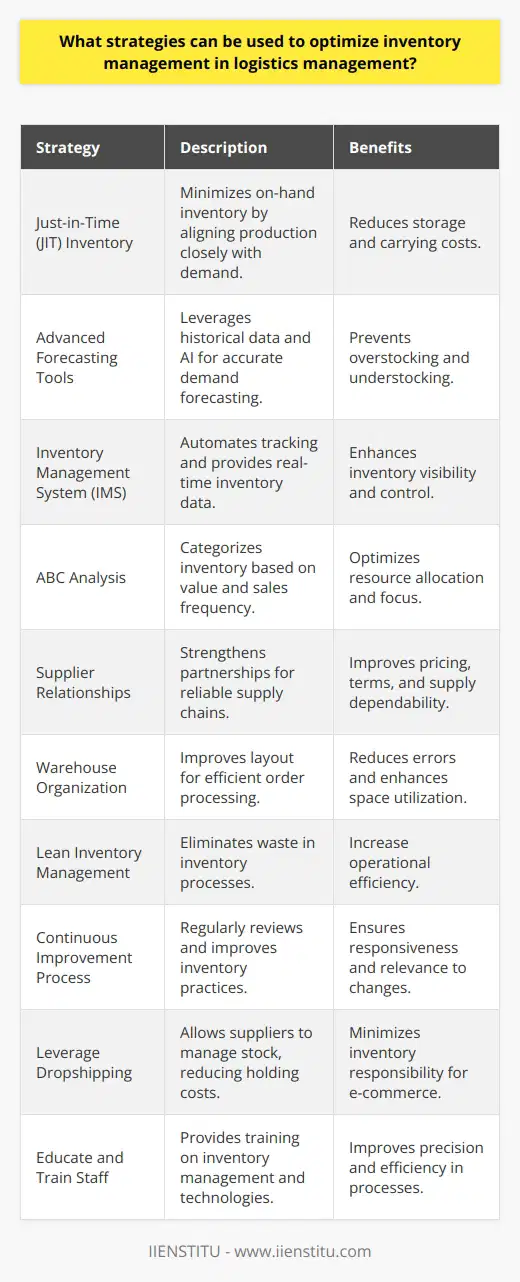
How can data and technology be utilized to improve customer service in logistics management?
Data and technology can be used to improve customer service in logistics management by providing real-time data to inform decision-making and automating processes to reduce manual labor. Companies can use data analysis to gain insight into their inventory levels, identify areas for improvement, and make adjustments to their processes. Additionally, technology can be used to provide automated customer service solutions, such as automated order tracking, online customer support, and automated customer service notifications. By utilizing data and technology, companies can create an efficient and cost-effective logistics management system that will help them achieve success while providing excellent customer service.

What are some cost-effective methods for increasing efficiency in logistics management?
Cost-effective methods for increasing efficiency in logistics management include utilizing data analysis to gain insight into inventory levels, leveraging technology to automate processes, and reducing manual labor. Companies can also use data and technology to provide real-time data to make informed decisions, streamline processes, and create an efficient system. Additionally, companies should look into ways to optimize inventory management, reduce costs, and improve customer service. By utilizing these strategies, companies can increase efficiency and achieve success in logistics management.

What are the key elements of a well-rounded logistics strategy?
Effective Inventory Management
The first key element of a well-rounded logistics strategy is effective inventory management. It involves having enough stock on hand to meet customer demand and preventing stockouts or overstock scenarios.
Sophisticated Demand Forecasting
Accurate demand forecasting is another crucial aspect. It involves predicting customer demand patterns and timing accurately. Mishandling demand forecasting can lead to either excess inventory or stock shortages.
Optimal Distribution Networks
Creating an optimal distribution network is also significant in a comprehensive logistics strategy. It involves selecting the most efficient transport modes and designing an efficient network of warehouses.
Effective Supplier Management
Supplier management, involving timely communication and effective relationships with suppliers, is equally notable. Well-managed supplier relationships lead to better inventory control and reduced logistics costs.
Use of Technology in Operations
Incorporating technology in logistics operations like automated warehousing, real-time tracking, and data-driven decision making greatly enhances logistics efficiency and effectiveness.
Adoption of Sustainable Practices
The last fundamental element is adopting sustainable practices. Today's customer is more aware and prefers businesses with a green focus. Integrating sustainable practices in logistics may also offer significant cost savings.
In conclusion, a well-rounded logistics strategy should address these key areas: inventory management, demand forecasting, optimal distribution networks, effective supplier management, use of technology, and adoption of sustainable practices. Altogether, these elements aim to meet customer demand efficiently, maintain a balanced stock, minimize costs, and advance towards sustainable logistics.
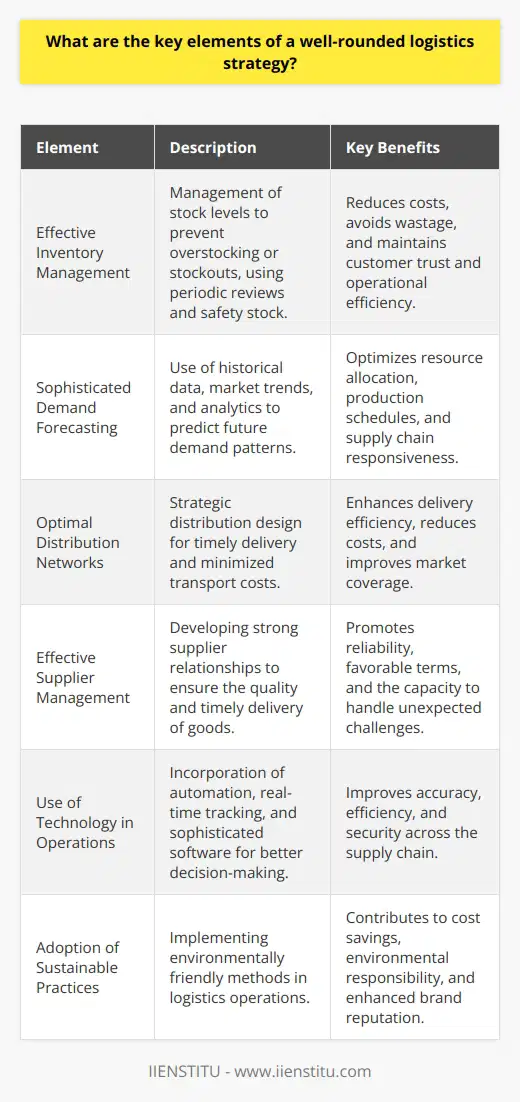
How can logistics management strategies be adapted to address sustainability and environmental concerns?
Adaptation of Strategies
Adapting logistics management strategies to address sustainability and environmental concerns revolves around efficiency and innovation.
Increased Efficiency
The first step is to maximize efficiency. We can accomplish this by reducing wastage. An effective way is to optimize transportation choices – this means leaner fuel choices and smarter route planning. This reduces the amount of pollution caused by the transportation of goods.
Another aspect of efficiency is packaging. Sustainable packaging materials or less packaging overall can significantly decrease environmental impact.
Technology and Innovation
Innovation is another crucial element. Advancements in technology create opportunities for logistics managers to integrate green principles into their everyday operations. Digital technology like data analytics can facilitate green supply chain management.
For example, using technology in the form of vehicle tracking systems can optimize routes, reducing fuel consumption and CO2 emissions. Furthermore, use of technology can enhance warehouse management. Automated systems can boost accuracy and speed, reducing energy use and waste.
Minimizing Reverse Logistics
Additionally, minimizing reverse logistics - the process of managing product returns - can also contribute to sustainability. This reduction can optimize the use of resources and decrease waste. It also prevents unnecessary transportation, lessening the environmental impact.
Holistic Approach
Lastly, any adaptation of strategies must take a holistic approach. Sustainability should be at the heart of decision-making processes, from procurement to product delivery. This comprehensive action can bring about a fundamental change in operations, making them more environmentally friendly.
In summary, incorporating green principles in logistics management strategies can significantly improve sustainability. Through maximizing efficiency, encouraging innovation, minimizing reverse logistics, and advocating a holistic approach, these adjustments can effectively address environmental concerns.
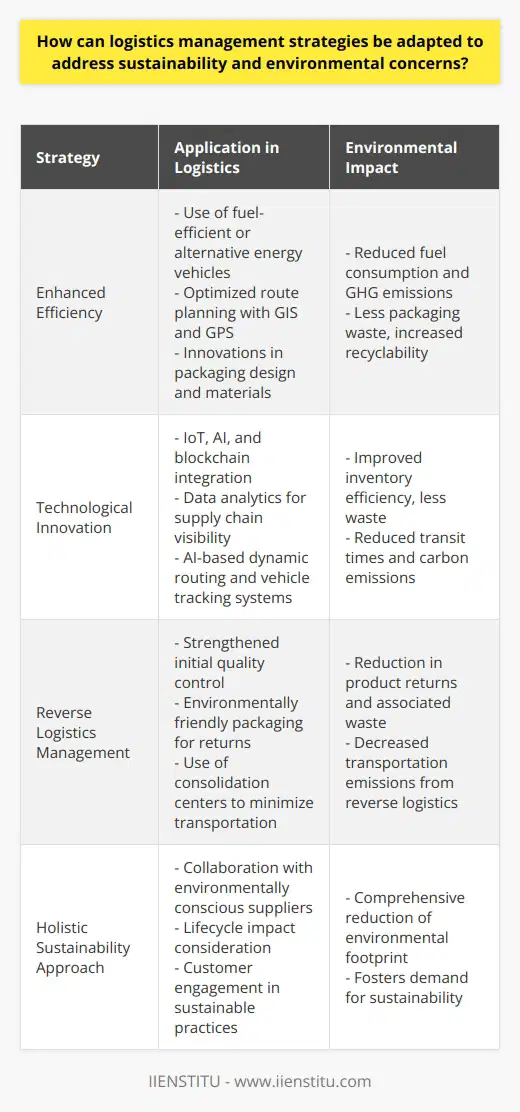
In the context of global supply chains, what strategic approaches can be employed to minimize disruption in logistics operations?
Diversification Strategy
A strategic approach to minimize disruption in logistics operations is diversification. This involves sourcing materials or products from various geographical locations and suppliers. Diversification buffers impacts from localized disruptions, such as natural disasters, strikes or political instability.
Digitization and Technology Integration
Next is digitization and technology integration. Companies can employ advanced technologies such as machine learning, AI, and IoT. These platforms provide real-time visibility into the supply chain, predictive analytics, and end-to-end supply chain orchestration. As a result, companies can respond quickly to changing circumstances.
Risk Management Practices
The use of risk management practices is another viable strategy. It includes the identification, assessment, and prioritization of risks followed by coordinated responses. Effective risk management helps in predicting potential problems, and in timely executing mitigating actions.
Formation of Strategic Alliances
Forming strategic alliances enhances the ability to manage disruptions. Cooperation with other firms provides greater agility and flexibility. It allows sharing resources or rerouting supplies when disruptions occur.
Pre-investment in Buffer Stock
Lastly, pre-investment in buffer stock helps cope with unexpected changes in supply and demand. This approach ensures the continuous flow of goods, even if temporary supply chain disruptions occur. These strategies collectively increase the robustness and resilience of global supply chains, mitigating disruptions in a business's logistics operations.
